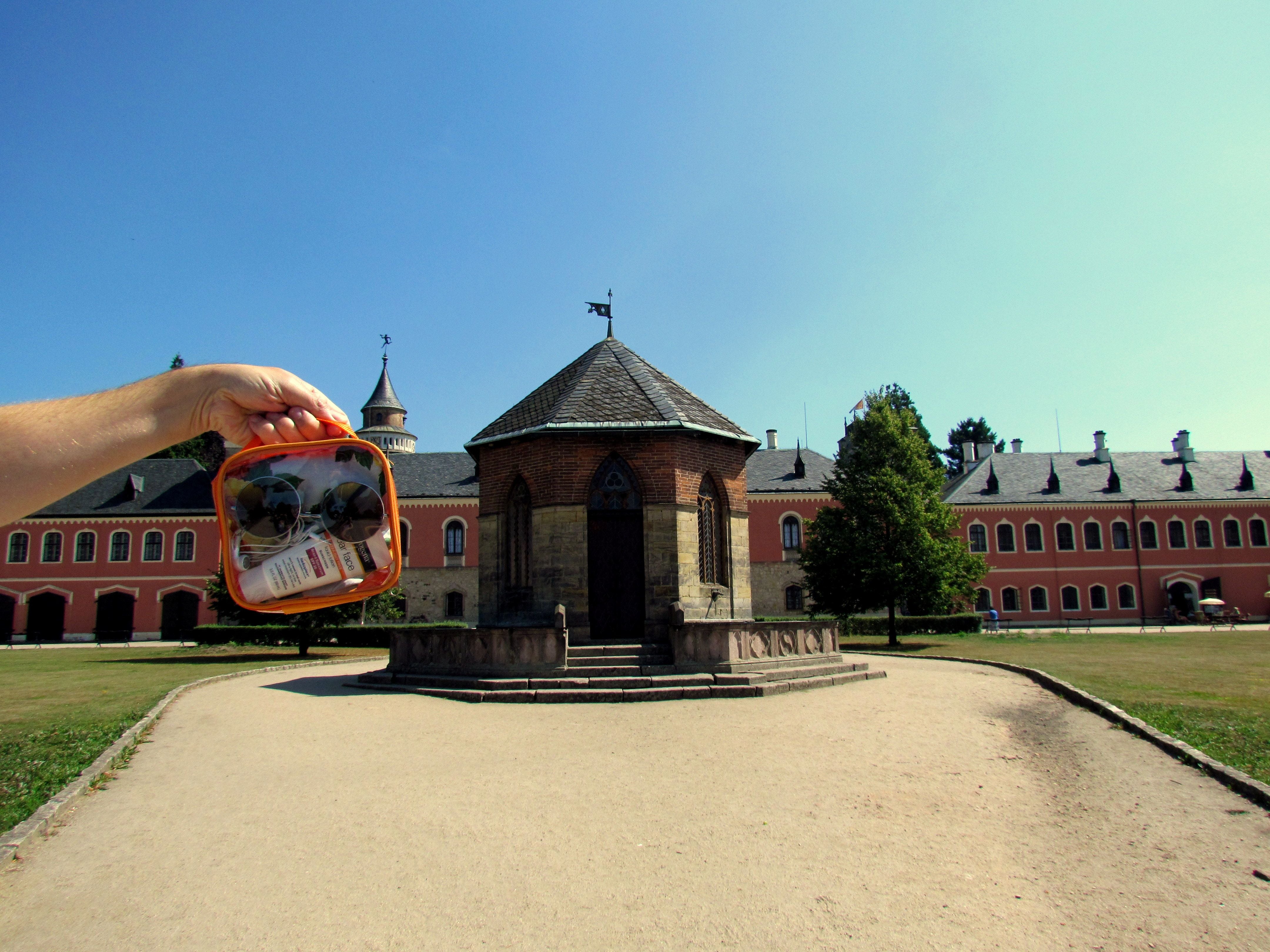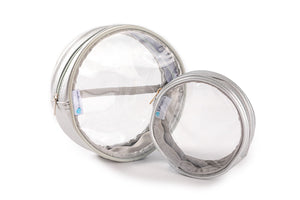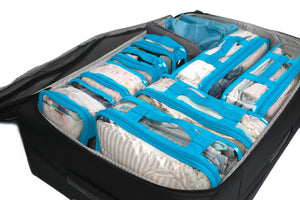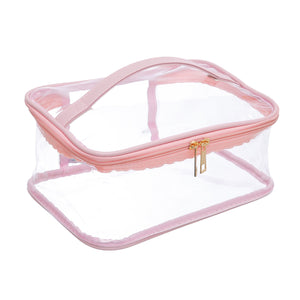Travel Safety Tips: A Complete Guide to Safer Travels in 2025
Posted by Bea Manzano on
If you’re anything like us, you’ve watched enough movies to know that safety is super important when voyaging alone in a foreign place. Not to mention being skeptical about new people you meet and knowing a bit of self-defense, too. *cough* Taken *cough*
But seriously though, whether you are going on a trip alone or with a group, internationally or domestically, whether for holiday or business, it’s best to know how to stay safe. It doesn’t hurt to be prepared. You don’t think it will happen to you until it happens to you. That being said, pay attention to these up-to-date travel safety tips for all you wanderers out there.
Things to do before your trip
Safe travel starts not during your trip but even before it has begun. Making necessary preparations during the trip will save you from a lot of trouble along the way.
✓ Conduct a light investigation of the place you’re going
You’re no detective but with the internet at your disposal, you can easily research and do a risk assessment of the country, or region, or neighborhood that you are visiting. It’s crucial to know your destination thoroughly before you arrive. What do you need to search for?
• Travel Advisories - Learn about the travel alerts or warnings for your destination.
• Local Norms and Culture - You don't want to offend the local people by being unaware of their social customs. Be respectful of other people’s traditions. For instance, many countries in Southeast Asia find it disrespectful if you wear shoes inside a house or a building, or wear tank tops and shorts in temples.
• Most Common Local Scams - Check the local news or ask online about the most common travel scams or possibility of tourist hostility in the area.
• Tourist Safety - Reach out to people who have been to the same country or region and learn from their experiences.
• Vaccination Information - In line with the recent Corona Virus outbreak, it’s best to be updated with your vaccines and ensure you get all destination-specific vaccines before traveling.
• Local Language - Learn how widely English is spoken in that area. However, you should also learn common phrases such as “hello,” “thank you,” “please,” “excuse me,” and “do you speak English?” in their language to interact somehow with locals.
• Local Currency - It is best to exchange money at your bank in your home country rather than when you’re at the airport or at your destination. Don’t get ripped off at the airport!
✓ Book your accommodation in a ‘Safe Zone’
There are many lodgings that are suspiciously inexpensive because of certain risks in that area. Be smart. Check the reviews and consider booking fairly-priced accommodations than fishy low-cost ones. We recommend reserving a hotel or airbnb with quick access to the hospital, police, and the airport.
✓ Check your passport’s validity… 3 or 6 months?
Some countries will not allow you to enter if your passport is going to expire, for example, in 6 months at the time of your visit. Check the expiry date and do the necessary process to renew, if needed. Some countries that require 6 months validity for passports are: Brazil, Turkey, Uganda, Venezuela, and most Southeast Asian countries like Thailand, Malaysia, Vietnam, Philippines, Indonesia, etc. Check out this website to know most popular countries visited by tourists and travelers that require 6 months passport validity.
Pro Tip: It is also best to ensure a high quality photocopy of your passport and other important travel documents and email them to yourself and to a family member.
✓ Alert your bank, friends and family that you’re traveling
Save your bank’s contact number so you can alert them in case your cards get stolen. As for your family and friends, send them a copy of your itinerary and the window of time when you’re expected to be back. If something goes awry, they’ll have more info to help with your situation.
General Safety Tips for Travelers
You can never be too cautious. It’s best to be prepared for whatever situations you might face along the way. Here are some important tips to ensure safe travels.
Tip #1 - Register with your embassy
For American travelers, there is a way to notify the embassy about your trip for free with the Smart Traveler Enrollment Program. It allows the U.S. Embassy to contact you in case of an emergency, whether it’s a natural disaster, a civil unrest, or a family emergency. There may be a similar program for other countries.
Tip #2 - Don’t draw attention. Pay attention!
Be careful not to wear flashy clothing and accessories. Try not to look too much like a tourist as well. You will be an easy target for crooks to mug. Learn how to blend in the crowd by dressing like a local and being aware of your surroundings. Be mindful of the people and the things happening around you.
Pro Tip: If you don’t know where you are, don’t make it obvious! Pretend you know the area. When you check Google Maps, use your earphones (as if you’re listening to music) and listen to GPS.
Tip #3 - Avoid sketchy areas. Trust your gut!
Ask the front desk at your hotel (or Airbnb Host) for safe places to visit or some great restaurants to check out. Ask their advice about safety in the area. Also, do not go exploring the city late at night. It’s a recipe for getting lost.
Pro Tip: When you go out with some locals you just met, be sure to have transport ready to take you back to your hotel. Don’t share too much with strangers. Don’t get too drunk and forget where you’re staying!
Tip #4 - Communication is key
Update your friends and family from time to time. When you take pictures during your night out, especially with strangers you just met, send them to a friend or a family member so they know where you're at and who's with you.
Tip #5 - Secure your valuables in subtle ways
There are many ingenious ways of protecting your most treasured items. As crooks and thieves get more inventive in their schemes, you must keep up with the pace and get two steps ahead of them. Here are some creative and useful hacks to outwitting the bad guys:
Invest in a decent anti-theft bag or RFID blocking wallet / cellphone case.
• Make use of travel locks for extra protection.
• Never put your wallet in your back pocket or your phone, cash, money bag in your bag’s compartment where it’s easy for thieves to take.
• Carry a dummy wallet with a large bill folded over a few small bills.
• Hide extra money in your shoes.
• Keep a spare credit card hidden.
Pro Tip: Use ATMs during daytime. Carry smaller sums of money that you will need only for the day. When walking in a crowded area, wear your backpack in front.
Use this Small Packing Cube to organize your essentials and keep it at the bottom of your bag.
Tip #6 - Learn basic self defense
In most cases, when you get mugged, it’s best not to fight back and lose a few dollars than to get injured. However, if you are attacked, that’s when you can fend off your assailant. This is a basic need to know how to stay safe while traveling alone.
Tip #7 - Pack your own First Aid Kit
It’s important to keep track of your health while traveling. Aside from bringing your own med kit, it’s also helpful to know how to administer first aid to yourself or someone when the need arises. Here are the basics you should have in your kit:
✓ Prescribed Meds
✓ Sterile Gauze Dressings
✓ Bandages
✓ Disposable Sterile Gloves
✓ Alcohol-Free Cleansing Wipes
✓ Skin Rash Cream
✓ Antiseptic Cream
✓ Paracetamol
✓ Cough Medicine
✓ Antihistamine Cream / Tablets
Pro Tip: This TSA Approved First Aid Kit Bag is perfect for holding emergency items you might need.
Tip #8 - Have multiple copies of emergency info
Save contact emergencies on your phone, like the hotel you’re staying in, your bank or credit card company, the embassy, local tourist police units, etc. Also have written copies of important phone numbers in case your phone gets stolen.
Tip #9 - Be cautious of public WiFi
When your WiFi is turned on, it constantly shares your identity and can possibly call previously saved networks. If you are to connect to a public WiFi, use VPN (Virtual Private Network). It hides your network activity and data from prying eyes. This is especially helpful when you are doing online banking.
Staying Safe in Transit
It pays to be cautious even when you’re in transit. Transportation crime is a recurring problem for many cities and countries across the globe, most of them happening to women. We recommend the following safety tips:
Tip #10 - Always clutch your bag
Keep your personal belongings attached to you and keep an eye on them at all times. Double check the zippers and make sure they’re closed. Don’t show your phone or other valuables that you have inside your bag by fumbling through them. Only carry what is necessary.
Tip #11 - Choose your public transpo seat wisely
Find an aisle seat preferably near the driver or operator. This gives you easier access on and off a bus or train in case of an emergency. Avoid standing or sitting too close to the platforms or doors where thieves may easily grab your valuables.
Pro Tip: Stand in well-lit, busy waiting and exit areas with security surveillance cameras. Travel through stations with both to ensure your safety.
Tip #12 - Don’t fall asleep! Be observant.
No matter how sleepy you feel, fight through it; you don’t want to wake up with your valuables gone. Try focusing on the behavior of people around you. If you ever feel uncomfortable by another passenger’s demeanor, change your seat, inform the driver, or get off the transportation if possible. Make sure you are not being followed when you leave. Always trust your instincts in these situations.
Tip #13 - Download Google Maps offline
If you want to cut down on data roaming costs while traveling, we suggest you download Google Maps offline and any specific location you want to go to while you still have access to the internet. Download and store the info on your device before your trip and enjoy faster loading times and real-time traffic updates.
Tip #14 - Have the exact fare ready
To avoid being swindled by drivers, ask in advance how much the fare is and have it ready. Chances are, if you ask the rate of the fare when you get to your destination, they’ll increase the price and have you pay for extra. We also recommend looking up the standard price for taxi services in the area so you know when you’re being ripped off.
Tip #15 - Sightsee during off-peak hours
Traveling during off-peak hours means less crowds. Less crowd means less chances of having your items stolen. Less chances of having your items stolen means being able to enjoy your trip to the fullest! It also allows you to explore different sites and take pictures without having to put up with so many tourists in your way.
Tip #16 - Download the local Uber / Lyft app
For more convenient transportation, download local Uber or Lyft apps. It's much safer than hailing a taxi since the transaction is cashless. It also allows you to track the driver's position and route, and communicate with the driver if needed.
Safety Tips for Your Hotel / Airbnb

Done unpacking your things and ready to head out? Don’t get too comfortable. Take extra precautionary measures whenever you leave or whether you’re inside your hotel room. It pays to be ready in all kinds of situations anywhere.
Tip #17 - Double check locked doors
Make sure your doors are locked, whether going outside or when you retire for the night. Investing in a fairly-priced hotel or Airbnb with trusted security and facilities will keep you from constantly worrying about your safety. Read some customer reviews before making reservations.
Tip #18 - Make a designated “key spot” in your bag
You may get fined for lost keys. It’s best to create a spot in your bag, purse or backpack that you will always find your keys. Once you come home to your accommodation, create a spot you’ll leave your keys as well (on your bedside table, desk, etc). That way you’ll know exactly where to look each time. If you’re staying in a hotel, you could also give your keys to the receptionist for safekeeping. However, that’s only if you are very forgetful and don’t mind having to go through the front desk every time.
Tip #19 - Don’t leave your valuables in plain sight
Or better yet, don’t leave your valuables at all. Keep your wallet, phone, and other valuable items with you at all times. If you have to leave your laptop behind, make sure to keep it in a place where no one can find it, not even the housekeepers.
Pro Tip: Organize your clothes in packing cubes using this Starter Set and place your laptop (or other valuables) in the middle, sandwiched by your garments. You will know if somebody tampered with your things if it’s jumbled and out of place.
Tip #20 - Keep the radio or TV turned on
If you’re planning to go out and won’t be back for a while, pull a little Kevin McCalister stunt and leave the radio or TV on while you’re away. Turn the volume loud enough for it to be audible outside. This will keep your hotel room / Airbnb off the thieves’ to-rob list, thinking there’s somebody inside.
Tip #21 - Know where the exits are located
After getting your things settled, take a look around the hotel or inn that you’re staying to get familiar with stairwells, fire escapes, and emergency plans. Better yet, ask the staff to show you the exits near your room in case of an emergency.
Tip #22 - Prepare an ‘Emergency Kit’
When things get out of hand, it's best to have an Emergency Kit ready (we recommend this Small Packing Cube) containing all your valuables such as passport, travel documents, extra cash, ID, and credit cards for an easy grab-and-go to the exit. This is especially convenient in the event of a fire, earthquake, or any unprecedented disaster.
Health Safety Tips
More than anything else, you need to be extra cautious and mindful of your health. Here are some helpful tips that can guide you when traveling.
Tip #23 - Be insured!
When you choose your travel insurance, make sure you are covered for a proper hospitalization, if the need arises. Also, if you have a health condition, or are pregnant, arrange any necessary pre-existing coverage process with your insurance company.
Tip #24 - Beware of mosquito bites
These tiny, pesky disease-carrying insects can cause several serious illnesses such as malaria, yellow fever, and dengue fever, to mention a few. Make sure to wear a repellent to keep mosquitoes at bay. When outside, wear clothes that cover your body, especially areas that are prone to mosquito bites such as arms and legs.
Tip #25 - Buy water bottles and avoid street food
While it’s always fun and cool to try exotic food in foreign places, make sure the foods are cooked well and the water is treated. It's better to dine in restaurants than street stalls, eat fruit and vegetables that can be peeled than the ones that are already packed in plastic. Always bring your own bottled water. If you are to refill your container, make sure to boil the water first.
Tip #26 - Pack your own hygiene kit… Wipes!
Before opening door handles, pressing buttons in an elevator, touching railings, grabbing a chair, or even resting your hands on a table, wipe the surface first! You can’t be too careful nowadays, especially with the recent pandemic. Put your health safety on top priority. Bring a hygiene kit with you wherever you go. You should include:
✓ Wet Wipes
✓ Alcohol
✓ Hand Sanitizer
✓ Tissues
✓ Pocket Soap
✓ Nail Clipper
✓ Sanitary Pads / Tampons (for the ladies)
Pro Tip: Keep a hygiene kit in this Clear Circle Pouch so you can easily throw in your purse and stay organized on the go.
Tip #27 - Bring your own cutlery and reusable straw
This will make you more comfortable and safe health-wise when eating out. Rather than asking for a plastic fork and spoon, bringing your own utensils can help save the environment. When drinking your frappe or iced coffee, make sure to use your own stainless steel straw. You’re not only protecting yourself from any risk of contamination, you’re also protecting the world from too much plastic use.
Remember, these tips will remain as tips unless you put them into practice. Keep in mind that the world out there is not as scary as you think. You can still have lots of fun while traveling without compromising your safety.
Consider this: studies suggest that you are more likely to lose things than have it stolen. For specific travel safety according to region or country, visit this amazing website.
Got any travel safety tips you want to share with us from your own experience? We’d love to hear them!
0 comments














